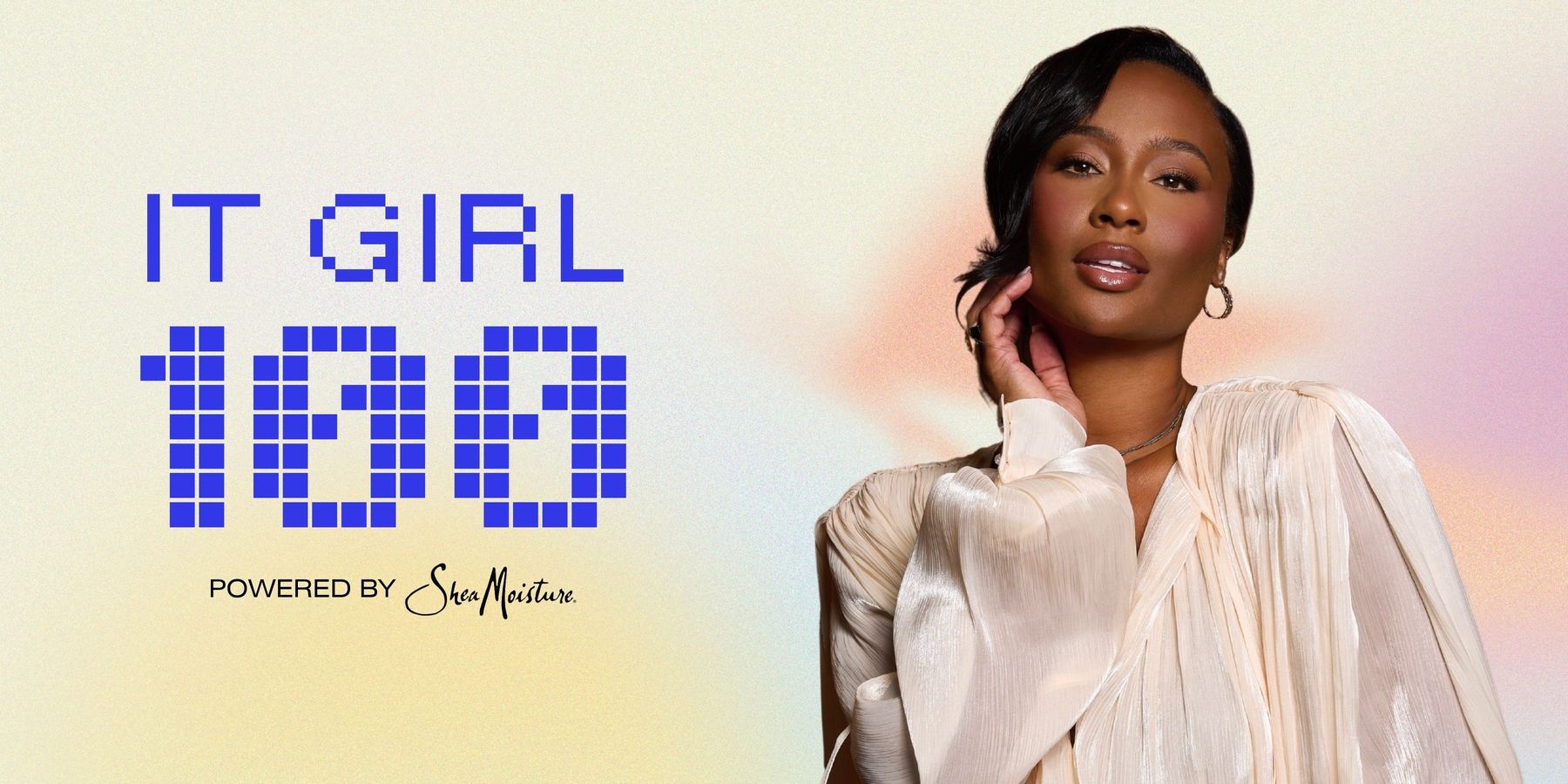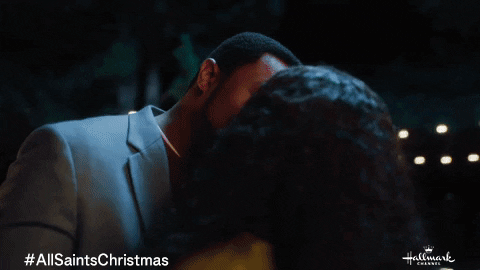Hollywood Director Nzingha Stewart Shares Why It’s Important To Stand Tall In Your Vision

Nzingha Stewart has never been one to back down from a challenge. At the start of her career, the challenge was getting behind the camera back when female directors were an anomaly, where she shot over a hundred music videos such as Common's "The Light," Sunshine Anderson's "Heard It All Before," and Nivea's "Don't Mess With My Man". She then transitioned into the television world, adding shows like Grey's Anatomy and Scandal to her carefully crafted resume. And when Hollywood hesitated to open up their doors, she burst through them by writing and directing her own TV films With This Ring (Regina Hall, Jill Scott and Eve) and Love By the 10th Date (Meagan Good, Andra Fuller, and Keri Hilson).
For Nzingha, being a black woman isn't a limitation; it's an opportunity.
While the entertainment industry may try to put directors of color in a box, women like Nzingha think outside of them—leaving a noteworthy trail of creative clips for future filmmakers to follow. Though the ethnic name that she adopted while on a trip to Senegal may sometimes cause the industry to turn a blind eye to her talents, Nzingha refuses to play Stevie Wonder along with them. Instead, she continues to prove that black women can tell narratives beyond that of their own. Her latest feature film, Tall Girl (Netflix), tells the story of a teenage girl who overcomes her insecurities and stands tall in who she is, a theme that all people can relate to.
In this xoChat, the director shares how she overcame feeling uncomfortable in her own skin, why she'd rather do good work than try to change people's minds, and the importance of standing firm in your vision, even in the midst of opposition.
xoNecole: What drew you to the script for Netflix’s ‘Tall Girl’?
Nzingha Stewart: There's a kind of sweetness and pain of adolescence. When I was the age of watching John Hughes movies, I felt like they spoke to me because they were so honest and allowed kids to have this real feel of vulnerability. I wanted to make that movie for this generation. I wanted to be able to talk to them like your feelings at this age and your insecurities, all of that is valid and it's beautiful.
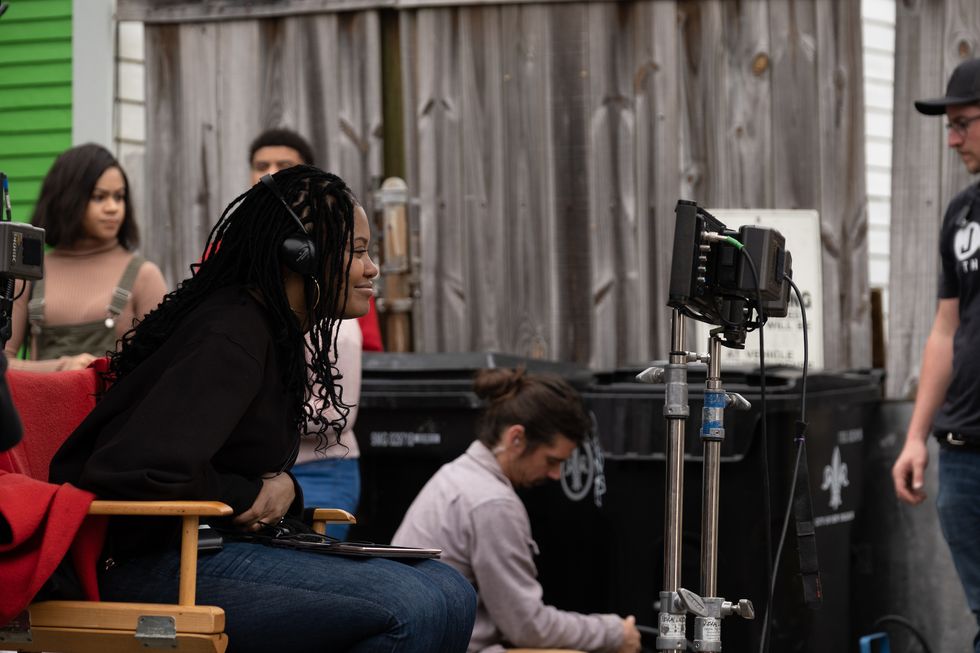
Courtesy of Netflix
Was there ever a moment where you felt uncomfortable in your own skin?
Oh my God, every single day (laughs). I'm a pretty shy person; even small talk is so uncomfortable. I get painfully shy sometimes and have to stay in my head and continually have a running dialogue like, "It's okay; it's just a person. Just say, 'How are you?' back." I completely relate to that. Jodi doesn't necessarily have painful shyness, but she does have insecurities, and there's a beautiful scene in the movie where she says, "Sometimes you just don't want to be seen." For me, it might be a part of why I'm so shy, because I'm afraid that I'll say something crazy or embarrass myself, and I think that character has a similar thing. She just doesn't want to be seen.
Where did you grow up, and how did it influence your style of writing and directing?
I'm from Brooklyn, New York originally, and then moved to Atlanta for all of my high school years. When I was in New York I went to the United Nations International School (UNIS). At UNIS, every kind of person on earth was represented there. It was like you're a minority if you're American. So, I do feel like I grew up at an early age just learning all people have an interesting story, and they don't have to look like you; they don't have to have the same story as yours, but there are things that we can all relate to. Like with Tall Girl, maybe I'm not 6'2'', but I do relate to the insecurity, and it really is just lovely when you can connect over just having a shared experience.
You started your career creating music videos for artists such as Common, Eve, Jay-Z, and 50 Cent, and then transitioned into commercials and television and film. What made you focus on music videos at the beginning of your career?
I loved music videos (laughs). I was one of those kids who came home super early after school, and writing felt like something where if you didn't have any money and you were a black girl, you could do that without anything else. I wasn't from one of those families where we had a film camera and a projector. If you get this McDonald's meal on Sunday, feel blessed. It felt like writing was something I could at least control; I didn't have an excuse that I didn't have this or that.
So I could write, but I always felt like my heart was in the visual image. When I got to New York, it would be somebody who wanted to rap who had some money—probably not from legal sources—but wanted to rap, so I got to build a reel of just local rappers. Building that kind of reel got me other work and got me the video with Common, which became a hit, and then led to everything else.
At that time in your career, what was it like for black women music video directors?
Here's what's interesting. Most people weren't used to seeing black women on set as a director. However, because I was in music videos, it was a different experience than being in Hollywood and feature films because I was working with rappers, so I was working with black men. They had grown up a lot of the time with single moms—where their mom may have only had $5, but you were going to eat, clothes were going to be clean, and stuff was going to be in order. So, there was a difference when I would work with them because they believed that I could do it. There wasn't a doubt. The fights weren't patronizing; they were just fights. There was a respect there. But when I started taking meetings in Hollywood, there wasn't that belief that I could do it in the way that there was in a Jay-Z, 50 Cent and Kanye who saw their mom put things together.
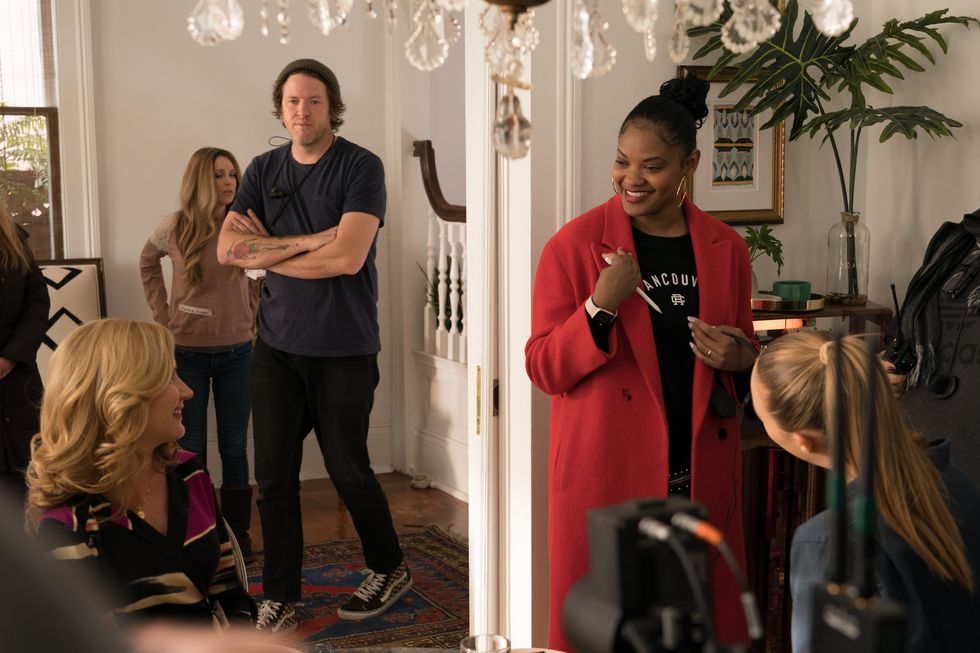
Courtesy of Netflix
"When I started taking meetings in Hollywood, there wasn't that belief that I could do it in the way that there was in a Jay-Z, 50 Cent and Kanye who saw their mom put things together."
How did you overcome those doubts from people?
I don't think you can change their mind; I think you have to change your mind. There's something very real [about] just staring down the universe and being like I'm going to stand here and get my way. I don't care what it looks like right now; I'm going to do this. I don't care how many times I get knocked down, I'm just going to stay here until the universe is finally just like, 'Fine,' and you start to see things happen.
But it's very hard to change people's mind. There's no incentive for them to change their minds because what if you do mess up? What if they're right? What proof do you have that you're any different than anybody else? So, you have to change your mind and say, "I know I'm this good and I'm not moving until everything else falls in line."
"You have to change your mind and say, 'I know I'm this good and I'm not moving until everything else falls in line.'"
In an interview you said you haven’t always protected your vision, especially very early in your episodic career. Can you speak to how you learned to stay true to your vision without coming across as the “difficult black woman”? Is that even something that comes up in the TV/Film world?
It definitely does. I mean, it came up in Tall Girl. You have to know the material so well from the inside-out that you know when it's right to fight for something. You almost have to remind yourself, 'If I fight for this I might be seen as difficult, if I don't I might be seen as not good, because I know later on in the edit, I'm going to need that.' So I would rather fight and be seen as difficult, than to not fight and to be seen as a hack.
Was there something in particular that you had to fight for in ‘Tall Girl’?
In Tall Girl, there was a scene at the end where I just went home feeling like we didn't get it, and I know no one is going to want to spend the money to do this again, but I know in my gut that we didn't get it. So, I went to the producers and I went to Netflix. Luckily, they were like if you really feel that way we trust you and we can reshoot the scene, and they gave me everything I needed to make it happen again. Which, you never want to reshoot something, but I'm so happy seeing the finished result that I listened to that inner voice.
Television is different because then you really cannot be difficult, black or otherwise. You have to realize that in TV, the writer is the boss, and they're not hiring you so much for your vision as for your eye. They want you to protect their vision, so you have to go into it differently.
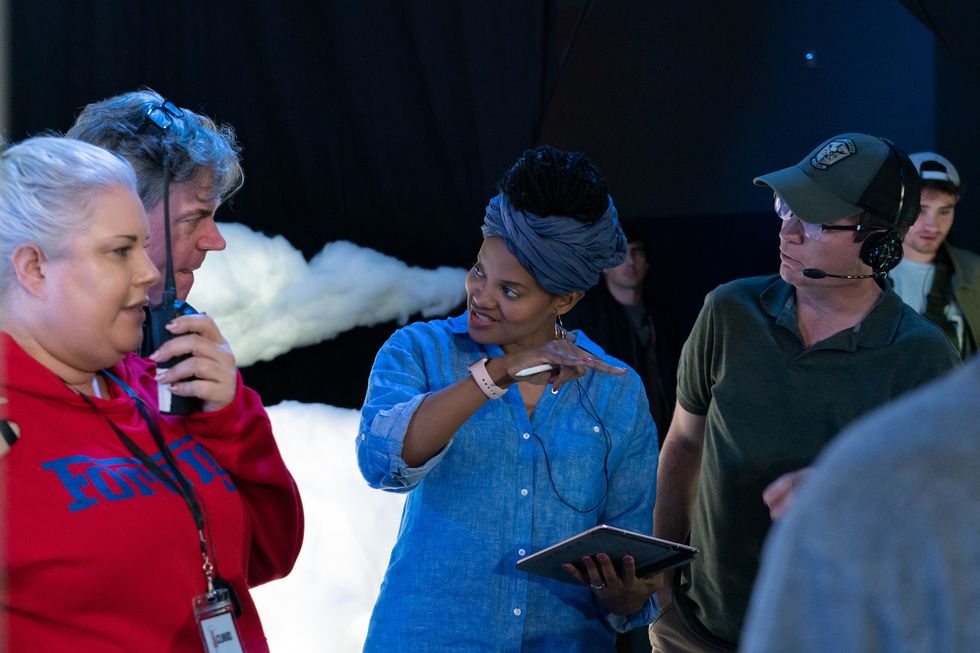
Courtesy of Netflix
"I would rather fight and be seen as difficult, than to not fight and to be seen as a hack."
Where do you get your creative inspiration?
Keep the tank full in terms of making time when you're busy to watch as much as you can watch, go to exhibits—just be around creativity. Even a trip to the gallery can spark something. Understand that part of your work is creatively refilling. Going to a concert, going to a museum, checking out a photography show, all of those things are part of the work.
For more of Nzingha, follow her on Instagram. Tall Girl is now streaming on Netflix.
Featured image by Getty Images
- Nzingha Stewart - IMDb ›
- Tall Girl's familiar teen love story fails to reach new heights ›
- Nzingha Stewart To Direct Teen Drama 'Tall Girl' For Netflix ... ›
- Netflix, McG & Director Nzingha Stewart Team On 'Tall Girl' Teen ... ›
- Now Casting: Play the Lead Role in Nzingha Stewart's Netflix ... ›
- Nzingha Stewart on 'Tall Girl' and Knee-Jerk Reactions to its Trailer ›
- Nzingha Stewart - Wikipedia ›
- 'Tall Girl' Review: Struggling to Rise Above - The New York Times ›
- Nzingha Stewart Tall Girl Director Talks Movie Backlash ›
- Netflix, McG & Director Nzingha Stewart Team On 'Tall Girl' Teen ... ›
Exclusive: Viral It Girl Kayla Nicole Is Reclaiming The Mic—And The Narrative
It’s nice to have a podcast when you’re constantly trending online. One week after setting timelines ablaze on Halloween, Kayla Nicole released an episode of her Dear Media pop culture podcast, The Pre-Game, where she took listeners behind the scenes of her viral costume.
The 34-year-old had been torn between dressing up as Beyoncé or Toni Braxton, she says in the episode. She couldn’t decide which version of Bey she’d be, though. Two days before the holiday, she locked in her choice, filming a short recreation of Braxton’s “He Wasn’t Man Enough for Me” music video that has since garnered nearly 6.5M views on TikTok.
Kayla Nicole says she wore a dress that was once worn by Braxton herself for the Halloween costume. “It’s not a secret Toni is more on the petite side. I’m obsessed with all 5’2” of her,” she tells xoNecole via email. “But I’m 5’10'' and not missing any meals, honey, so to my surprise, when I got the dress and it actually fit, I knew it was destiny.”
The episode was the perfect way for the multihyphenate to take control of her own narrative. By addressing the viral moment on her own platform, she was able to stir the conversation and keep the focus on her adoration for Braxton, an artist she says she grew up listening to and who still makes her most-played playlist every year. Elsewhere, she likely would’ve received questions about whether or not the costume was a subliminal aimed at her ex-boyfriend and his pop star fiancée. “I think that people will try to project their own narratives, right?” she said, hinting at this in the episode. “But, for me personally – I think it’s very important to say this in this moment – I’m not in the business of tearing other women down. I’m in the business of celebrating them.”
Kayla Nicole is among xoNecole’s It Girl 100 Class of 2025, powered by SheaMoisture, recognized in the Viral Voices category for her work in media and the trends she sets on our timelines, all while prioritizing her own mental and physical health. As she puts it: “Yes, I’m curating conversations on my podcast The Pre-Game, and cultivating community with my wellness brand Tribe Therepē.”
Despite being the frequent topic of conversation online, Kayla Nicole says she’s learning to take advantage of her growing social media platform without becoming consumed by it. “I refuse to let the internet consume me. It’s supposed to be a resource and tool for connection, so if it becomes anything beyond that I will log out,” she says.
On The Pre-Game, which launched earlier this year, she has positioned herself as listeners “homegirl.” “There’s definitely a delicate dance between being genuine and oversharing, and I’ve had to learn that the hard way. Now I share from a place of reflection, not reaction,” she says. “If it can help someone feel seen or less alone, I’ll talk about it within reason. But I’ve certainly learned to protect parts of my life that I cherish most. I share what serves connection but doesn’t cost me peace.
"I refuse to let the internet consume me. It’s supposed to be a resource and tool for connection, so if it becomes anything beyond that I will log out."

Credit: Malcolm Roberson
Throughout each episode, she sips a cocktail and addresses trending topics (even when they involve herself). It’s a platform the Pepperdine University alumnus has been preparing to have since she graduated with a degree in broadcast journalism, with a concentration in political science.
“I just knew I was going to end up on a local news network at the head anchor table, breaking high speed chases, and tossing it to the weather girl,” she says. Instead, she ended up working as an assistant at TMZ before covering sports as a freelance reporter. (She’s said she didn’t work for ESPN, despite previous reports saying otherwise.) The Pre-Game combines her love for pop culture and sports in a way that once felt inaccessible to her in traditional media.
She’s not just a podcaster, though. When she’s not behind the mic, taking acting classes or making her New York Fashion Week debut, Kayla Nicole is also busy elevating her wellness brand Tribe Therepē, where she shares her workouts and the workout equipment that helps her look chic while staying fit. She says the brand will add apparel to its line up in early 2026.
“Tribe Therepē has evolved into exactly what I have always envisioned. A community of women who care about being fit not just for the aesthetic, but for their mental and emotional well-being too. It’s grounded. It’s feminine. It’s strong,” she says. “And honestly, it's a reflection of where I am in my life right now. I feel so damn good - mentally, emotionally, and physically. And I am grateful to be in a space where I can pour that love and light back into the community that continues to pour into me.”
Tap into the full It Girl 100 Class of 2025 and meet all the women changing game this year and beyond. See the full list here.
Featured image by Malcolm Roberson
If there is one thing that I am going to do, it’s buy myself some scented soy candles. And, as I was looking at a display of them in a TJ Maxx store a couple of weekends ago, I found myself wondering just who decided which scents were considered to be “holiday” ones. The origin stories are actually pretty layered, so, for now, I’ll just share a few of ‘em.
I’m sure it’s pretty obvious that pine comes from the smell of fresh Christmas trees; however, scents like cloves, oranges, and cinnamon are attributed to two things: being natural ways to get well during the cold and flu season, and also being flavors that are used in many traditional holiday meals.
Meanwhile, frankincense and myrrh originate from the Middle East and Africa (you know, like the Bible does — some folks need to be reminded of that—eh hem — Trumpers) and ginger? It too helps with indigestion (which can definitely creep up at Thanksgiving and Christmas dinner tables); plus, it’s a key ingredient for ginger snaps and gingerbread houses. So, as you can see, holiday-themed scents have a rhyme and reason to them.
Tying this all in together — several years ago, I penned an article for the platform entitled, “Are You Ready To Have Some Very Merry ‘Christmas Sex’?” Well, in the spirit of revisiting some of that content, with a bit of a twist, I decided to broach some traditional holiday scents from the perspective of which ones will do your libido a ton of good from now through New Year’s Eve (check out “Make This Your Best NYE. For Sex. EVER.”).
Are you ready to check some of them out, so that, whether it’s via a candle, a diffuser, some essential oil, or some DIY body cream (check out “How To Incorporate All Five Senses To Have The Best Sex Ever”), you can bring some extra festive ambiance into your own boudoir? Excellent.
1. Vanilla
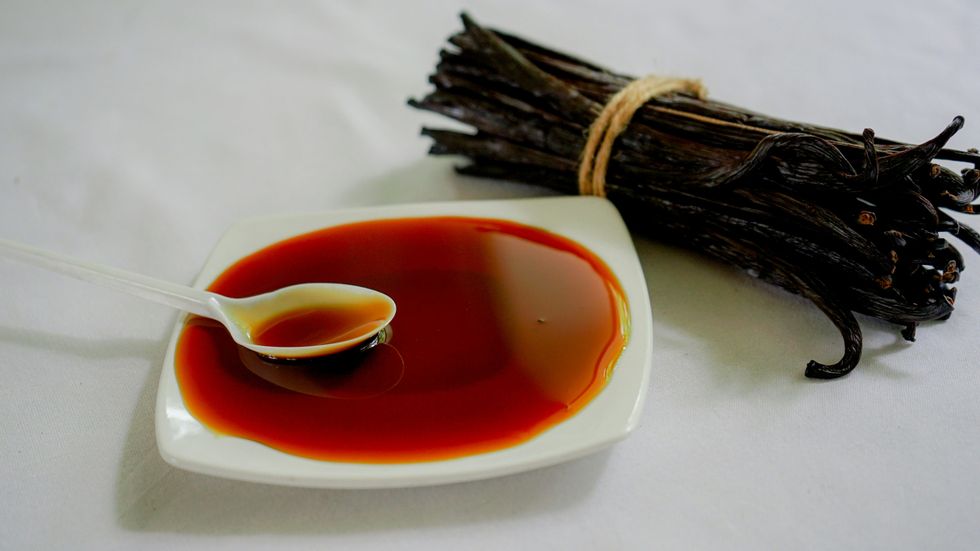
Unsplash
When it comes to holiday desserts, you’re going to be hard-pressed to find recipes that don’t include vanilla — and that alone explains why it is considered to be a traditional holiday scent. As far as your libido goes, vanilla is absolutely considered to be an aphrodisiac — partly because its sweet scent is considered to be very sensual. Some studies even reveal that vanillin (the active ingredient in vanilla) is able to increase sexual arousal and improve erectile dysfunction in men. So, if you adore the smell, here is more incentive to use it.
2. Frankincense

Unsplash
Although, typically, when people think about frankincense (and myrrh), it’s in the context of the gifts that the wise men brought Christ after he was born; it’s a part of the biblical Christmas story. However, frankincense goes much deeper than that. Sexually, since it has an earthy and spicy scent, some people like to use it to meditate (check out “What Exactly Is 'Orgasmic Meditation'?”). Also, since it has the ability to put you in a better mood, soothe and soften your skin and maintain your oral health — with the help of frankincense, every touch and kiss can be that much…sexier.
3. Cinnamon

Unsplash
I already gave cinnamon a shout-out in the intro. Personally, I’ve been a fan of it, in the sex department, for a long time now (check out “12 ‘Sex Condiments’ That Can Make Coitus Even More...Delicious”). When it’s in oil form, it can be very sweet to the taste while sending a warm sensation throughout the body — which is why the giver and receiver of oral sex can benefit from its usage. Beyond that, cinnamon helps to increase blood flow to your genital region, elevate sexual desire and, some studies say that it can even help improve fertility. Beautiful.
4. Peppermint
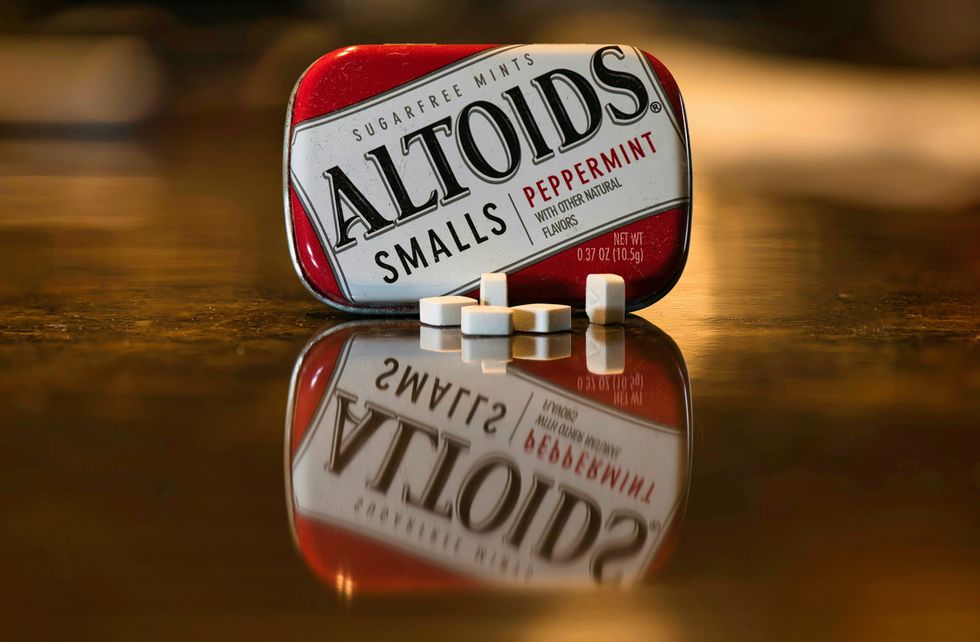
Unsplash
If there’s a signature candy for the holiday season, it’s probably a candy cane — which automatically puts peppermint in the running for being an official holiday scent. Pretty much, in any form, it’s got your sex life’s back because it’s hailed as being a sexual stimulant; in part, because its smell is so invigorating. Plus, it helps to (eh hem) ease headaches, it gives you more energy and it can definitely help to freshen your breath. Also, that minty sensation? The same thing that I said about cinnamon can apply to peppermint too (if you catch my drift).
5. Ginger

Unsplash
Whether it’s in a meal or in your bedroom, ginger is going to produce results that are hella spicy. On the sex tip, science has praised ginger for being able to increase sexual arousal, improve blood circulation (which intensifies orgasms) and strengthen fertility for many years. Scent-wise, I find it to be one that both men and women enjoy because it is both woodsy and sweet. So, if you’ve got some massage oil in mind, adding some ginger is a way to please you both.
6. Pomegranate

Unsplash
September through December is the time of year when pomegranates are considered to be in season. And, as someone who is a Rosh Hashanah observer, I have a personal adoration for them because I am aware of the various things that they symbolize in Hebrew culture including the fact that they are a fruit that represents love and fertility. So yeah, they would absolutely be an aphrodisiac — one that is perfect for this time of the year. While consuming it helps to boost testosterone levels in both men and women, the floral bittersweet smell that it produces can help to reduce stress while promoting relaxation (like most floral scents do) — and the more relaxed you are, the easier it is to climax.
7. Nutmeg
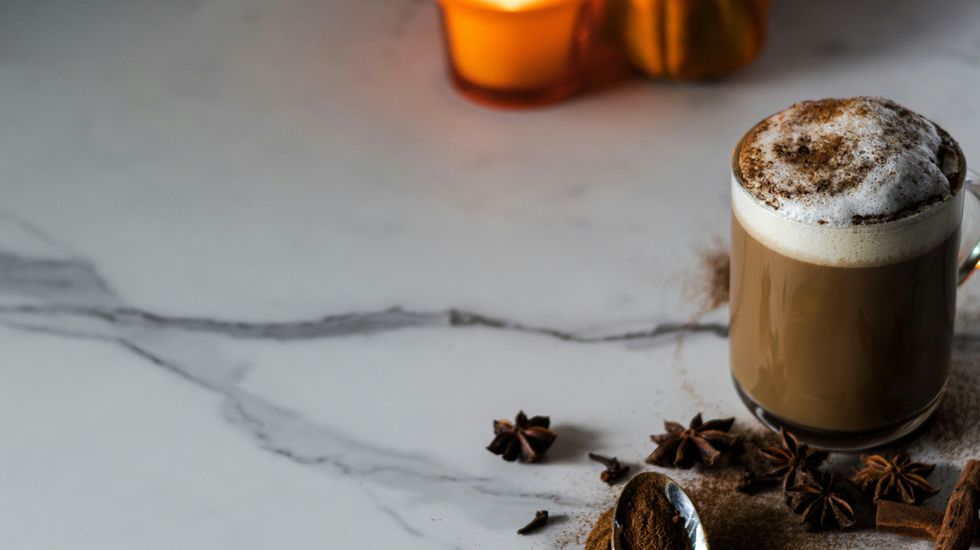
Unsplash
Another signature seasoning during the holiday season is nutmeg. It’s perfect in Thanksgiving sweet potato (or pumpkin) pie and Christmas morning French toast. And yes, it can also make your sex life better. If you consume it, it can intensify your libido and, overall, its warm-meets-spicy-meets-sweet smell is so inviting that it is considered to be a pretty seductive scent.
8. Cloves
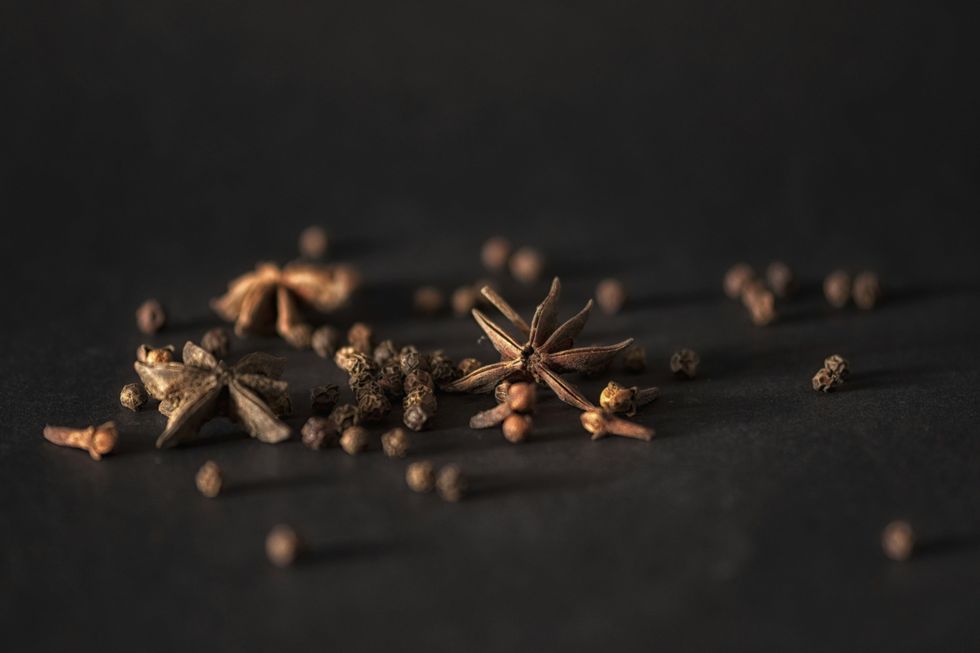
Unsplash
I ain’t got not one lie to tell you — if you’ve got a toothache, put some clove oil on that bad boy and send me a Christmas present for putting you on game. Aside from that, as I round all of this out, cloves are another holiday scent that can do wonders for your sex life. For men, it has the ability to significantly increase sexual arousal and improve stamina and endurance. For men and women alike, it also has a reputation for strengthening sexual desire. And for women solely? Well, if you want an all-natural way to increase natural lubrication down below — the scent and and feel (in DILUTED oil form) can make that happen. It can make the holidays especially special…if you know what I mean.
Ah yes — the atmosphere of the holidays and what it can do.
Take it all in! Scent ‘n whatever stimulating that comes with it! #wink
Let’s make things inbox official! Sign up for the xoNecole newsletter for love, wellness, career, and exclusive content delivered straight to your inbox.
Featured image by Giphy








